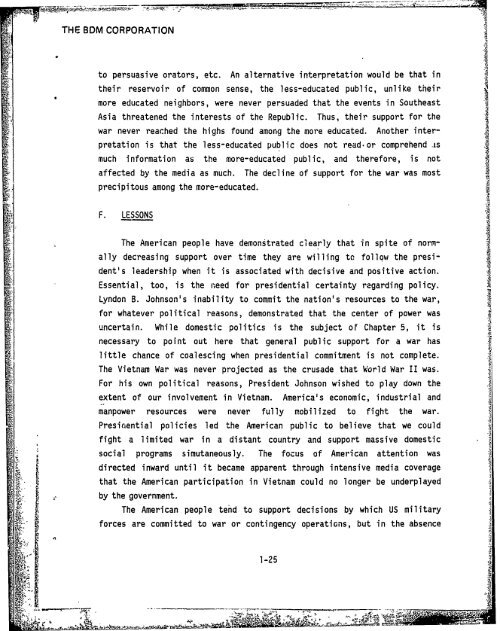policy - The Black Vault
policy - The Black Vault
policy - The Black Vault
Create successful ePaper yourself
Turn your PDF publications into a flip-book with our unique Google optimized e-Paper software.
THE BDM CORPORATION<br />
to persuasive orators, etc. An alternative interpretation would be that inA<br />
their reservoir of common sense, the less-educated public, unlike their<br />
more educated neighbors, were never persuaded that the events in Southeast<br />
Asia threatened the interests of the Republic.<br />
war never reached the highs found among the more educated.<br />
Thus, their support for the<br />
Another interpretation<br />
is that the less-educated public does not read. or comprehend is<br />
much information as the more-educated public, and therefore, is not<br />
affected by the media as much.<br />
precipitous among the more-educated.<br />
F. LESSONS<br />
<strong>The</strong> decline of support for the war was most<br />
<strong>The</strong> American people have demonstrated clearly that in spite of normally<br />
decreasing support over time they are willing to follow the president's<br />
leadership when it<br />
Essential,<br />
is associated with decisive and positive action.<br />
too, is the need for presidential certainty regarding <strong>policy</strong>.<br />
Lyndon B. Johnson's inability to commit the nation's resources to the war,<br />
for whatever political reasons, demonstrated that the center of power was<br />
uncertain. While domestic politics is the subject of Chapter 5, it is<br />
necessary to point out here that general public support for a war has<br />
little chance of coalescing when presidential commitment is not complete.<br />
<strong>The</strong> Vietnam War was never projected as the crusade that World War II was.<br />
For his own political reasons, President Johnson wished to play down the<br />
extent of our involvement in Vietnam. America's economic, industrial and<br />
manpower resources were never fully mobilized to fight the war.<br />
Presinential policies led the American public to believe that we could<br />
"fight a limited war in a distant country and support massive domestic<br />
social programs simutaneously. <strong>The</strong> focus of American attention was<br />
directed inward until it became apparent through intensive media coverage<br />
VI. •that the American participation in Vietnam could no 'longer be underplayed<br />
Sg<br />
by the government.<br />
<strong>The</strong> American people tend to support decisions by which US military 4<br />
forces are committed to war or contingency operations, but in the absence<br />
"1-25
















